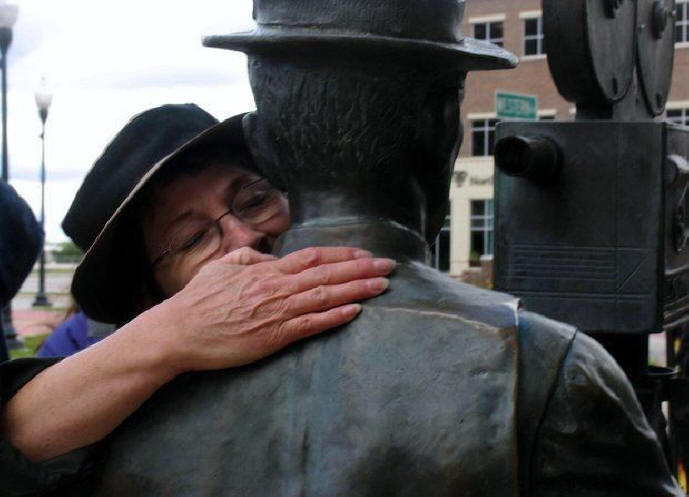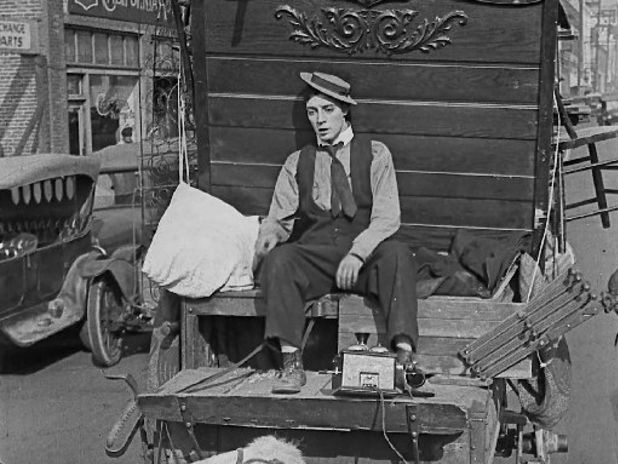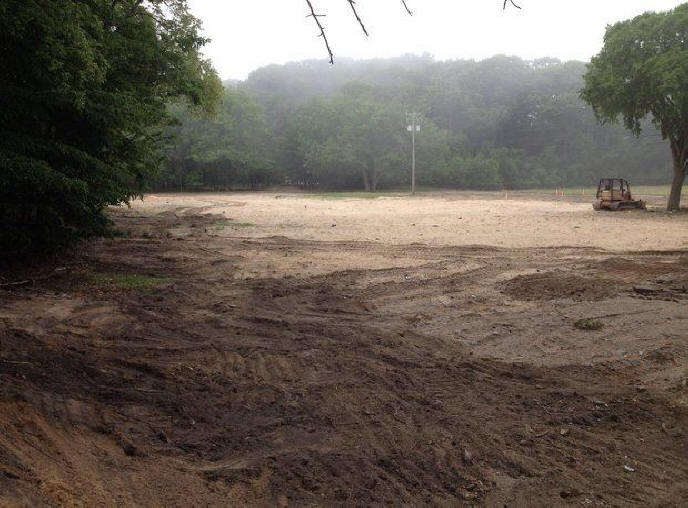By Dave LeMiux | MLive
October 6, 2014This
week 81 years ago ...
As big as the odds were against some
of the memorable characters Buster
Keaton created for his movies, the odds
against the actor/director who fondly
remembered his summer sojourns here were
greater still.
On Oct. 7, 1933, The
Chronicle said,
KEATON MIRTHFUL AS HE RECALLS
CHILDHOLD
Buster Keaton, the straight-faced
comedian of stage and screen, laughed
long and heartily here last night when
he returned for the first time in more
than 15 years to his old hometown –
Muskegon – and to the "happiest, most
peaceful community" he has known in a
world of travels – Bluffton and the
Actors' colony.
Disappointed when he could not come
over from Chicago on the "Alabam" of
which he used to sing in vaudeville with
"The Old Man and Maw," Mr. and Mrs. Joe
Keaton, he chartered an airplane and
flew in with his little brother Harry
"Jingles" Keaton, his wife and their
huge St. Bernard dog.
ARRIVE UNHERALDED
Unheralded they landed at the
Muskegon County Airport at about 3:30
p.m. and slipped down to Bluffton to
meet their old friends Mr. And Mrs.
William "Mush" Rawls, with whom they
spent the night.
After a dozen of Frank Pascoe's fried
perch – "Oh, were they good!" – and a
couple of hours of sleep, Buster was
ready to roam about the neighborhood
visiting a few of his old friends.
Until the wee small hours of the
morning it was: "Mush, do you
remember...?" and he was off on another
story of some prank he played upon "The
Old Man," Lew Earl, the Pearl Brothers,
Lex Nell, "Pop" Millard or some old-time
member of the Actors' Colony.
Dressed up as a plumber in droopy
blue overalls, white shirt, a huge brown
bow tie, a brown felt hat – his
loose-joined arms and feet draped over
the arms of a chair or waving about in
characteristic attitudes, he entertained
a small group of friends at the home of
Mr. and Mrs. Ernest W. Krueger, 1827
Edgewater, for several hours.
It was Mush and Ella's idea that he
go over to Ma Krueger's dressed like a
plumber and ask to fix the pipes (Buster
was an inseparable pal of Keith Krueger
when they were boys together at Bluffton
and looked so much alike they were
mistaken for one another by their own
parents). But he couldn't put it over on
Mrs. Krueger, who knew him instantly and
welcomed him with open arms.
Then the stories began.
There was the time the Keaton family
was on a split week vaudeville bill with
Will Rogers playing three days in
Nashville, Tenn., and the next three in
Lexington, Ky., with a one-night stand
at the last minute in Paris, Ky.
PASS UP 'NIGHT IN PARIS'
But they never played Paris. The Old
Man got mad when he received a cartoon
drawn by Mush Rawls showing Will Rogers
dragging him with Buster trailing to
Paris and the following inscription:
"I've played a split week but never a
night in Paris – Mush." Buster's Dad
bucked and refused to play the Paris
engagement.
Buster has always known how to fall
hard without getting hurt. He had to
know how with Joe Keaton for a father.
For Joe used to throw him through the
backdrop every night for a case of Green
River.
"The question was 'How about a little
drink?" he recollected, "The answer was,
'Sure, let's have a Green River,' and
with that he'd throw me into a river
painted on the back drop. That always
got a laugh – AND a case of Green
River."
'TAUGHT' AT YALE
He told another story of the time
they were playing in New Haven and the
Yale boys decided to get rough. The
minute the Keatons started their act,
the college boys filling the first three
rows began to rumble and growl.
"There was a big fellow sitting in
the middle of the front row who was
leading the game," said Buster. "The Old
Man stopped the act and said, 'Now you
be quiet.' He went on and the boys
started up again. Joe stopped again and
said: 'If you don't be quiet, I'm coming
right over.'"
"Now the orchestra pit was three
musicians wide and the first row a
considerable drop below the stage," he
continued. "When Maw came out to play a
saxophone solo the big boy did the wrong
thing. The Old Man just picked me up and
threw me across the footlights,
orchestra pit and all, into those boys
on the front row.
"My hip broke the big fellow's jaw, a
foot broke the next fellow's nose and a
shoulder and cracked three ribs for the
guy on the other side,' he said. "The
Old Man never thought of what might have
happened to me. He accidentally gave me
a rap on the back of the head with a
kneecap one night and I fell straight
back striking on my head. I was out for
18 hours with a fractured skull – but
worked the act the second night after
the fall.
RUN OUT OF TOWN
"Oh, I've been hissed off the stage
and run out of town in my day," said the
movie star. "There was the night we
accidentally dropped Jingles on his head
– he was only 2 then – and the audience
got mad. It was too brutal. They climbed
over the footlights and we had to run."
"Speaking of brutal falls," he said,
"reminds me of one I did in 'The
Roundup' a few years ago out in
California. I drove up to location about
200 miles north of Los Angeles to find
Rudy Valentino's wife. She was there,
playing in the picture. They were making
a scene with an Indian who was supposed
to be shot and drop dead. The director
wasn't satisfied. I said, 'I'll do that
fall.' So he took me on."
Buster laughed – a big, broad laugh
with plenty of teeth showing. He was
having a 'large evening.'
RECALLS DAYS ON THE WATER
HERE
He recalled duck hunting up on Dave
Parson's marsh, motorboat racing on
Muskegon and Spring Lakes, Billy Clark's
"Baby Doll" and Lew Earl's "Dixie
Pirate" and "The Battleship," all
powerboats which will be remembered by
older residents of Bluffton and
Muskegon.
He recalled the day he broke up the
Bluffton school just to get the McGowan
boy out to play second base in a ball
game at North Muskegon, how he rigged up
two coils in the old Keaton family boat
so he could shift from the good one to
the bad "to make The Old Man think she
wasn't working so we could take a ride
without him knowing it," how he emptied
a can of kerosene down the sidewalk in
front of an old woman's house next to
the schoolhouse who used to throw the
boys' baseballs into the stove whenever
they landed on her lot, and a host of
other pranks.
Every few minutes he would call
himself aside to remember another song
or story about the happy days of a
quarter century ago.
VISITS OLD HOUSE
Today he visited Jingles' Jungle, the
Keaton's last home here, a little green
cottage perched on a sand hill on
Edgewater St. near the old Theatrical
Colony Yacht Club overlooking Muskegon
Lake.
He also called on a host of other
friends and looked up familiar landmarks
with his wife, brother and the Rawls.
He played St. Louis Thursday night,
met his wife, who drove from New York to
Chicago in their car and chartered a
plane to hop over to his old house in
Muskegon yesterday afternoon. They had
planned to take off at noon today in
their Bellanca cabin monoplane piloted
by Joseph Bailey of Chicago, but
indications were they might stay until
tomorrow – held by the memories of old
times.
RETURNING TO HOLLYWOOD
Buster and his wife have been away
from Hollywood for about five months but
are now on their way back by the end of
next week when he is to start making a
new picture.
They spent several months in Florida
and were ready to make part of a picture
in Cuba when the revolution broke out.
"We were down there about four months
ago as guest of the President who
insisted on getting the fleet out for
review – all four ships," he said with a
laugh.
While in the east he broadcast with
Rudy Vallee over a national radio
hookup. He has made about half a dozen
radio appearances and plans to make more
when he returns to Hollywood.
His wife is the former Miss May
Scribbens to whom he was married early
last year in Mexico. Joseph Keaton, the
key man in the old Keaton family act, is
alive and as well liked in California as
he was in Muskegon 25 years ago.
"Will Rogers at his best couldn't
compare with the Old Man in those days,"
said Buster with a son's loyalty.
KEATON'S RISE AND FALL
In 2002, the late film critic Roger
Ebert wrote of Buster Keaton, "... in an
extraordinary period from 1920 to 1929,
he worked without interruption on a
series of films that make him, arguably,
the greatest actor-director in the
history of the movies."
Not just silent moves. Not just
comedies. All movies for all time.
Ebert is not alone. In a short
biography of Keaton for the New York
Times, Mark Demming wrote, "Although his
career lacked the resilience of Charlie
Chaplin and Laurel and Hardy,
Buster Keaton may well have been the
most gifted comedian to emerge from the
cinema's silent era."
Keaton's film genius would not be
recognized until decades after his visit
here in 1933. In fact, Keaton's star was
already teetering on the brink of a
disastrous fall when he stopped here to
revisit what had been an idyllic summer
home during his years with the family's
vaudeville act.
Fired by the studio within a year of
his visit here (in part because of his
drinking), Keaton struggled to make a
living on the margins of the film
industry for some 25 years, writing gags
for other actors and taking bit parts in
low-budget films.
His story did not end there, however.
Keaton stopped drinking and by the 1950s
had made a long, slow climb back from
obscurity, working in such wildly
divergent projects as a short film by
playwright Samuel Beckett and surfing
films like "How to Stuff a Wild Bikini."
Keaton died of
cancer in 1966.
 By
Susan Coburn | MLive Guest Columnist
By
Susan Coburn | MLive Guest Columnist

